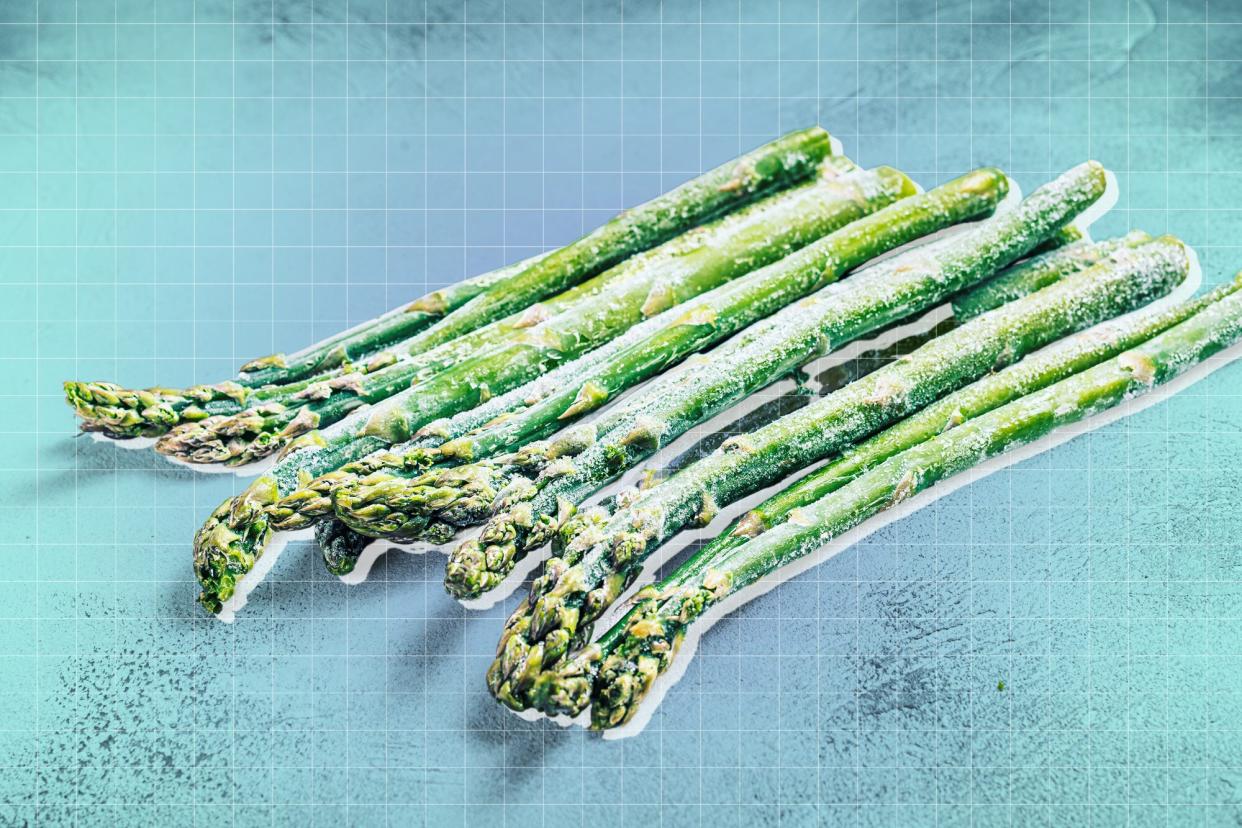Can You Freeze Asparagus?

Getty Images
Asparagus is an easy vegetable to love. In addition to being packed with impressive health perks, asparagus requires minimal prep and is often best enjoyed simply prepared, like sautéed, roasted or grilled. It's also perfect for rounding out one-pan meals and quick skillet dinners.
While you'll likely spot asparagus in the produce department year-round, this vegetable peaks in the spring. Between the months of February and June, asparagus is in its prime, with the most delectable spears harvested in April and May. If you find yourself with a bounty of asparagus, whether from your neighborhood farmers' market in peak season or during a sale run at your grocery store, consider freezing some to savor at a later date.
Here's everything you need to know about how to freeze fresh asparagus so it doesn't go to waste and still tastes delicious.
Related: What Is Purple Asparagus and How Do I Use It?
Can you freeze asparagus?
Fresh asparagus can be frozen, which is good news for those of us who enjoy cooking with this vegetable all year long. While it's best to use fresh asparagus in recipes where it isn't cooked (like in some salads), previously frozen asparagus works great in most other recipes. Oftentimes it doesn't need to be thawed before grilling, roasting on a sheet pan, or tossing into stir-fries and pastas.
The best way to freeze asparagus
The key to freezing asparagus so you'll actually want to eat it later is blanching, or quickly boiling the spears for a few minutes then immediately "shocking" them in an ice-water bath to stop the cooking. The blanched asparagus should be drained well and patted dry. Blanching most fresh vegetables is a simple way to remove excess dirt and bacteria and prevent significant vitamin losses. Blanching asparagus before freezing can also help to minimize texture changes and preserve its vibrant green color.
While you may be tempted to toss the blanched asparagus into a freezer bag at this point, it's best to flash-freeze it first, a simple extra step that freezes the spears or pieces individually so they don't stick together in the freezer.
How to freeze fresh asparagus
Follow these simple steps to freeze fresh asparagus:
Trim the asparagus spears. Keep them whole or cut them into large or bite-size pieces. (Refer to this simple guide for tips on how to cut asparagus.)
Blanch the asparagus in boiling water until just crisp-tender, 2 to 3 minutes. Use tongs or a fine-mesh strainer to transfer the asparagus to an ice bath (a large bowl of ice water) to stop the cooking. (Read all about how to blanch asparagus here.)
Drain the asparagus well and pat it completely dry with paper towels or a clean kitchen towel.
Spread the asparagus spears or pieces in a single layer on a sheet pan (give them space to keep them from freezing together) and freeze until solid, at least an hour.
Transfer the frozen asparagus into freezer-safe bags and seal to close, removing as much air as possible. Store in the freezer for up to six months.
How to freeze raw asparagus
While it's possible to freeze raw asparagus without blanching it first, this method isn't recommended if you want to preserve its flavor, texture and color (blanching deactivates the enzymes that would otherwise continue to break down vegetables). Chances are, you'll feel less inclined to use discolored and mushy asparagus down the road, and no one likes food waste. Taking the time to prep asparagus for freezing as outlined above will pay off later, trust us.
Related: Healthy Asparagus Recipes
How to freeze cooked asparagus
If you've cooked up more asparagus than you can eat in a week (cooked asparagus keeps for about four days in the fridge), you can freeze the rest. Keep in mind, shorter cook times typically result in better overall texture after freezing (scroll back to our suggestions on blanching). Asparagus that has been grilled, roasted or sautéed to crisp-tender will fare best after freezing.
To freeze, cool cooked asparagus completely before transferring to a freezer bag or freezer-safe container. Remove as much air as possible before sealing. Use asparagus within two to three months for best quality.
How to cook frozen asparagus
In most cases, frozen asparagus doesn't need to be thawed before cooking. Simply toss the spears in oil and season to taste before roasting or grilling them, or add them frozen to your sauté or stir-fry. Like other vegetables out of your grocer's freezer case, frozen asparagus can taste just as good as fresh in many recipes.
Bottom line
Freezing asparagus is great way to enjoy the veg at its peak-season best year round. The key to ensuring the spears keep their vibrant color and crisp texture is blanching them before freezing. And remember to flash-freeze first, so the frozen asparagus doesn't stick together in a clump.
Now that you know how to properly freeze asparagus, try the delicious veg in these popular recipes: Skillet Gnocchi with Shrimp & Asparagus, Chili-Rubbed Tilapia with Asparagus & Lemon and Garlic Butter-Roasted Salmon with Potatoes & Asparagus
Related: How to Cook Asparagus

